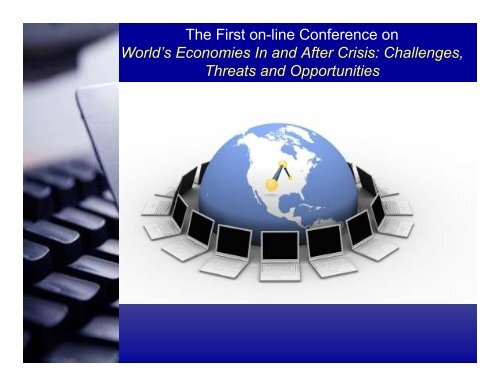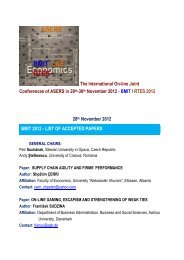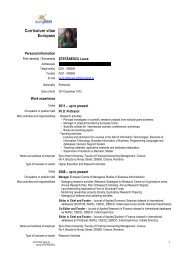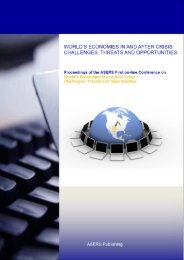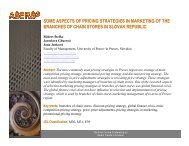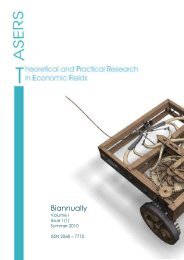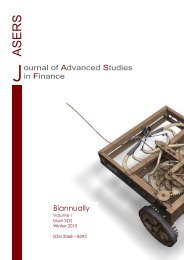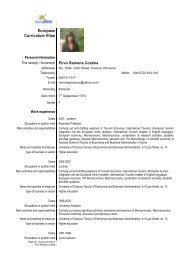The First on-line Conference on World's Economies In and ... - ASERS
The First on-line Conference on World's Economies In and ... - ASERS
The First on-line Conference on World's Economies In and ... - ASERS
Create successful ePaper yourself
Turn your PDF publications into a flip-book with our unique Google optimized e-Paper software.
<str<strong>on</strong>g>The</str<strong>on</strong>g> <str<strong>on</strong>g>First</str<strong>on</strong>g> <strong>on</strong>-<strong>line</strong> C<strong>on</strong>ference <strong>on</strong><br />
World’s Ec<strong>on</strong>omies <strong>In</strong> <strong>and</strong> After Crisis: Challenges,<br />
Threats <strong>and</strong> Opportunities
IS THE CRISIS BAD OR GOOD FOR THE ENVIRONMENT?<br />
Cristina Barbu<br />
Spiru Haret University, Craiova, Romania<br />
cristina_barbu2000@yahoo.co.uk<br />
Abstract:<br />
Over the last twenty years Romania’s ec<strong>on</strong>omy has grown. Many z<strong>on</strong>es have reduced poverty <strong>and</strong> improved<br />
educati<strong>on</strong>. During the last two years, industrial producti<strong>on</strong> has been affected by the crisis.<br />
<str<strong>on</strong>g>The</str<strong>on</strong>g>re are both immediate <strong>and</strong> l<strong>on</strong>g-term positive <strong>and</strong> negative envir<strong>on</strong>mental implicati<strong>on</strong>s of the crisis.<br />
Some of researchers think that the dec<strong>line</strong> in producti<strong>on</strong> will automatically lead to a lower level of polluti<strong>on</strong>. On<br />
the c<strong>on</strong>trary, other researchers think that the problem of polluti<strong>on</strong> may become worse during the crisis period.<br />
<strong>In</strong> our country, envir<strong>on</strong>mental protecti<strong>on</strong> seems to have a lower priority but the sustainable development is no<br />
l<strong>on</strong>ger a “choice.”<br />
Key-words: envir<strong>on</strong>mental protecti<strong>on</strong>, sustainable development, crisis.<br />
JEL Classifficati<strong>on</strong>: O13, P28, Q25, Q53,Q56.<br />
<str<strong>on</strong>g>The</str<strong>on</strong>g> <str<strong>on</strong>g>First</str<strong>on</strong>g> <strong>on</strong>-<strong>line</strong> C<strong>on</strong>ference <strong>on</strong><br />
World’s Ec<strong>on</strong>omies <strong>In</strong> <strong>and</strong> After Crisis: Challenges, Threats <strong>and</strong> Opportunities
1. Aims <strong>and</strong> scope of the paper.<br />
<str<strong>on</strong>g>The</str<strong>on</strong>g> global financial crisis, brewing for a while, really started to show its effects in the middle of 2007 <strong>and</strong><br />
into 2008. A part of the world’s scientists think that the crisis will move people to use less energy <strong>and</strong> help<br />
limit carb<strong>on</strong> emissi<strong>on</strong>s. <str<strong>on</strong>g>The</str<strong>on</strong>g> global slowdown means people will have less m<strong>on</strong>ey to buy. This translates<br />
into fewer products <strong>and</strong> goods being manufactured which means fewer natural resources used. <strong>In</strong> the<br />
short-term, as well as a reducti<strong>on</strong> in c<strong>on</strong>sumpti<strong>on</strong> of resources <strong>and</strong> technologies that emit or discharge<br />
polluti<strong>on</strong> can provide immediate relief to the envir<strong>on</strong>ment. Additi<strong>on</strong>ally, the drop in exports provides an<br />
opportunity to use new energy technologies domestically rather than send them overseas. That way, local<br />
envir<strong>on</strong>mental c<strong>on</strong>diti<strong>on</strong>s can be improved.<br />
Other part of the world’s scientists scientists argue that with the financial crisis, there will be less<br />
ec<strong>on</strong>omic activity around the globe within the next few years. This could mean people putting the<br />
ec<strong>on</strong>omy ahead of the envir<strong>on</strong>ment, although until very recently, the envir<strong>on</strong>ment got center stage in<br />
world attenti<strong>on</strong>.<br />
This paper tries to find out if the ec<strong>on</strong>omic crisis is good or bad for Romania’s envir<strong>on</strong>ment.<br />
<str<strong>on</strong>g>The</str<strong>on</strong>g> <str<strong>on</strong>g>First</str<strong>on</strong>g> <strong>on</strong>-<strong>line</strong> C<strong>on</strong>ference <strong>on</strong><br />
World’s Ec<strong>on</strong>omies <strong>In</strong> <strong>and</strong> After Crisis: Challenges, Threats <strong>and</strong> Opportunities
2. Review of the Literature<br />
Prof Hardisty examines the parallels between the causes of the current global financial crisis <strong>and</strong> the<br />
emerging global envir<strong>on</strong>mental crisis, <strong>and</strong> the differences in the ways that the world has resp<strong>on</strong>ded to<br />
each (Hardisty P.E. 2008). He discusses the possible c<strong>on</strong>sequences to the planet’s envir<strong>on</strong>ment from the<br />
effects of the crisis, particularly in the energy sector, <strong>and</strong> suggests that a real opportunity exists in the<br />
current climate to make profound changes to our instituti<strong>on</strong>s <strong>and</strong> decisi<strong>on</strong>-making processes, which will<br />
re-establish l<strong>on</strong>g-term envir<strong>on</strong>mentally, socially <strong>and</strong> ec<strong>on</strong>omically sustainable improvements in the human<br />
c<strong>on</strong>diti<strong>on</strong>.<br />
Lord Stern of Brentford, author of the government's influential report <strong>on</strong> climate change, has warned<br />
against the "danger" of letting the world ec<strong>on</strong>omic turmoil block acti<strong>on</strong> to build a low-carb<strong>on</strong> ec<strong>on</strong>omy<br />
(Stern, N. 2006). Stern's report for the Treasury in 2006 famously described climate change as the world's<br />
greatest "market failure". But he dismissed suggesti<strong>on</strong>s the current ec<strong>on</strong>omic crisis would prompt<br />
wholesale ec<strong>on</strong>omic reform: "We're talking about fixing a market failure <strong>and</strong> achieving growth of a different<br />
kind: low carb<strong>on</strong> growth."<br />
Mr. Barroso also said the troubles affecting the world ec<strong>on</strong>omy should not be allowed to distract from<br />
more serious risks posed by climate change: "One thing we have learned from the financial crisis is that, if<br />
we ignore risk building up in the system, it is much harder to manage that risk. We must recognize it early<br />
<strong>and</strong> tackle it."<br />
Amado de Jesus, (2006) said: with less m<strong>on</strong>ey to spend <strong>on</strong> research for dealing with envir<strong>on</strong>mental<br />
c<strong>on</strong>cerns, important programs may be suspended indefinitely as d<strong>on</strong>ati<strong>on</strong>s are reduced or driven away<br />
from envir<strong>on</strong>mentally oriented instituti<strong>on</strong>s.<br />
Ambitious plans that could be stopped or reduced in scope include investment in wind, solar <strong>and</strong><br />
renewable energy, carb<strong>on</strong> trading, biodiesel refining <strong>and</strong> burying carb<strong>on</strong> dioxide from coal-fired power<br />
plants.<br />
<str<strong>on</strong>g>The</str<strong>on</strong>g> <str<strong>on</strong>g>First</str<strong>on</strong>g> <strong>on</strong>-<strong>line</strong> C<strong>on</strong>ference <strong>on</strong><br />
World’s Ec<strong>on</strong>omies <strong>In</strong> <strong>and</strong> After Crisis: Challenges, Threats <strong>and</strong> Opportunities
3. <str<strong>on</strong>g>The</str<strong>on</strong>g> crisis in the world<br />
<str<strong>on</strong>g>The</str<strong>on</strong>g> current financial crisis is the result of an improperly-regulated banking <strong>and</strong> financial sector where the<br />
drive for corporate profits <strong>and</strong> pers<strong>on</strong>al wealth created a culture of risk-taking <strong>on</strong> an unprecedented scale.<br />
<strong>In</strong>dustrial producti<strong>on</strong> will be adversely affected by the crisis through both price effects that increase the<br />
cost of producti<strong>on</strong> <strong>and</strong> income effects that decrease the dem<strong>and</strong> for products in the markets (Magdoff, F.<br />
2002). However it is unclear how large <strong>and</strong> widespread the impact is. It is also possible that some<br />
enterprises may benefit from the crisis; for instance, sectors that utilize domestic raw material <strong>and</strong> export<br />
all their products. <str<strong>on</strong>g>The</str<strong>on</strong>g> financial crisis <strong>and</strong> climate change share some fundamental characteristics. Both<br />
are a c<strong>on</strong>sequence of speculative <strong>and</strong> narrow interests superseding the comm<strong>on</strong> interest, both evolved<br />
dramatically over the current decade <strong>and</strong> both have global implicati<strong>on</strong>s. Both are also about risk <strong>and</strong> how<br />
it is priced <strong>and</strong> managed— <strong>and</strong> the c<strong>on</strong>sequences when risk management goes wr<strong>on</strong>g.<br />
<str<strong>on</strong>g>The</str<strong>on</strong>g>re are also some fundamental differences. <str<strong>on</strong>g>First</str<strong>on</strong>g>, while the worst impacts of the financial<br />
crisis are likely to pass within a few years the impacts of climate change could be felt for centuries.<br />
Sec<strong>on</strong>d, the risks posed by climate change are much larger than those posed by the current global<br />
financial crisis.<br />
<strong>In</strong> the event of a financial or ec<strong>on</strong>omic crisis, envir<strong>on</strong>mental c<strong>on</strong>cerns are put <strong>on</strong> the back burner. One<br />
factor driving this behavior is the percepti<strong>on</strong> that the dec<strong>line</strong> in producti<strong>on</strong> will automatically lead to a lower<br />
level of polluti<strong>on</strong> (Garnaut, R. 2008). We show, <strong>on</strong> the c<strong>on</strong>trary, that the polluti<strong>on</strong> problem may become<br />
worse during the crisis period. <str<strong>on</strong>g>The</str<strong>on</strong>g> net effect <strong>on</strong> polluti<strong>on</strong> is determined by the interacti<strong>on</strong>s of three factors:<br />
dec<strong>line</strong> in producti<strong>on</strong>, increase in the abatement cost due to the higher input prices, <strong>and</strong> decrease in the<br />
expected cost of n<strong>on</strong>-compliance due to the lower inspecti<strong>on</strong> <strong>and</strong> enforcement rate caused by budget<br />
cuts. As a result, the reducti<strong>on</strong> in polluti<strong>on</strong> due to lower producti<strong>on</strong> is cancelled out by the increase in<br />
polluti<strong>on</strong> resulting from higher polluti<strong>on</strong> abatement cost <strong>and</strong> lower inspecti<strong>on</strong> <strong>and</strong> enforcement rates.<br />
<str<strong>on</strong>g>The</str<strong>on</strong>g> <str<strong>on</strong>g>First</str<strong>on</strong>g> <strong>on</strong>-<strong>line</strong> C<strong>on</strong>ference <strong>on</strong><br />
World’s Ec<strong>on</strong>omies <strong>In</strong> <strong>and</strong> After Crisis: Challenges, Threats <strong>and</strong> Opportunities
<str<strong>on</strong>g>The</str<strong>on</strong>g> struggle over envir<strong>on</strong>mental problems - the l<strong>and</strong>, air, <strong>and</strong> water degraded with pois<strong>on</strong>s <strong>and</strong> other<br />
harmful chemicals, the destructi<strong>on</strong> of large areas of forests, the depleti<strong>on</strong> of n<strong>on</strong>renewable resources, <strong>and</strong><br />
the loss of many species - goes through an ebb <strong>and</strong> flow similar to the class struggle. When enough<br />
people, sometimes even including representatives of capital, are c<strong>on</strong>cerned <strong>and</strong> mobilized over threats to<br />
their own health or the l<strong>on</strong>g-term well-being of the planet, real progress can occur in cleaning up the<br />
envir<strong>on</strong>mental mess that is <strong>on</strong>e of the twin crises of capitalist producti<strong>on</strong>. Of course, every effort is made<br />
by capital to socialize the costs of such cleanups, by using general tax revenues whenever possible<br />
(Magdoff, F. 2002).<br />
Before the crisis, people using public transportati<strong>on</strong> increased, they left their cars at home <strong>and</strong> car pooling<br />
gained popularity, all for the sake of fuel c<strong>on</strong>servati<strong>on</strong>.<br />
With the reduced price of oil today, due to the financial crisis, people may just decide to go back to using<br />
their cars. It could even dampen their initial enthusiasm to buy hybrid cars.<br />
According to a European Uni<strong>on</strong>-Commissi<strong>on</strong>ed Study, the global ec<strong>on</strong>omy is losing more m<strong>on</strong>ey from the<br />
disappearance of forests than through the current banking crisis. It estimates the annual cost of forest loss<br />
at between $2 <strong>and</strong> $5 trilli<strong>on</strong>. <str<strong>on</strong>g>The</str<strong>on</strong>g> report explains that as forests dec<strong>line</strong>, nature stops providing services<br />
which it used to provide essentially for free. C<strong>on</strong>sequently, we have to resort to building water reservoirs<br />
<strong>and</strong> facilities to sequester carb<strong>on</strong> dioxide, or farming foods that were <strong>on</strong>ce naturally available.<br />
<str<strong>on</strong>g>The</str<strong>on</strong>g> <str<strong>on</strong>g>First</str<strong>on</strong>g> <strong>on</strong>-<strong>line</strong> C<strong>on</strong>ference <strong>on</strong><br />
World’s Ec<strong>on</strong>omies <strong>In</strong> <strong>and</strong> After Crisis: Challenges, Threats <strong>and</strong> Opportunities
4. <str<strong>on</strong>g>The</str<strong>on</strong>g> crisis in Romania<br />
<strong>In</strong> the current macroec<strong>on</strong>omic c<strong>on</strong>text, Romania is exposed to the effects of ec<strong>on</strong>omic <strong>and</strong> financial crisis, which may<br />
materialize in the plan of real ec<strong>on</strong>omy, by slowing down the ec<strong>on</strong>omical growth <strong>and</strong> reducing the number of work<br />
places.<br />
<str<strong>on</strong>g>The</str<strong>on</strong>g> actors involved in the green sector see themselves forced to adapt their strategies, taking into account new global<br />
c<strong>on</strong>diti<strong>on</strong>s, the difficulties of accessing credits, the more expensive loans <strong>and</strong> even closure of some companies. <str<strong>on</strong>g>The</str<strong>on</strong>g><br />
green ec<strong>on</strong>omy is going down. And the ec<strong>on</strong>omic envir<strong>on</strong>ment of Romania is not exempt from the global effects of the<br />
financial crisis. Over the green businesses heavy clouds gathered. <strong>In</strong> the latter half of 2008 the overall amount spent to<br />
fund clean energy related projects dropped 25% <strong>and</strong> reached 18 billi<strong>on</strong> dollars. This amount will c<strong>on</strong>tinue to fall at the<br />
beginning 2009 (Deleanu, C. 2008). <strong>In</strong> recent m<strong>on</strong>ths, global green market has lost m<strong>on</strong>ey, <strong>and</strong> companies have cut<br />
ruthlessly from investments in alternative energy.<br />
At the category “potential effects”, it is c<strong>on</strong>sidered that the authorities - especially mayors <strong>and</strong> local councils - will be<br />
taken off their envir<strong>on</strong>mental resp<strong>on</strong>sibilities, again suffering from financial deprivati<strong>on</strong>. Moreover, the European funds<br />
intended for Romania will reach their beneficiaries in our country harder. Fund raising phenomen<strong>on</strong>, as well as<br />
envir<strong>on</strong>mental funds will be reduced; pressure <strong>on</strong> nature <strong>and</strong> natural resources will reduce due to the lack of liquidity,<br />
dem<strong>and</strong> for products, precious metal mining <strong>and</strong> quarrying with obvious impact <strong>on</strong> the envir<strong>on</strong>ment, which is already<br />
stimulated due to the increasing value of these metals in relati<strong>on</strong> to liquidity, are other effects of the crisis. <strong>In</strong> the same<br />
category, other c<strong>on</strong>clusi<strong>on</strong>s can be taken. Poor members of society, already exposed to envir<strong>on</strong>mental risks, are even<br />
more vulnerable, the more public funds, including European <strong>on</strong>es, are more difficult to reach, the more working<br />
c<strong>on</strong>tracts <strong>and</strong> envir<strong>on</strong>mental job c<strong>on</strong>tracts awarded by Procurement will be increasingly allocated preferentially.<br />
Some analysts believe that the signs of crisis are not very visible in envir<strong>on</strong>mental protecti<strong>on</strong>, provided that this is not a<br />
priority in Romania. "Not when actual c<strong>on</strong>straints had appeared, nor when budgets had not been adapted to the current<br />
weak ec<strong>on</strong>omic situati<strong>on</strong>, the envir<strong>on</strong>ment was not of age.<br />
<str<strong>on</strong>g>The</str<strong>on</strong>g> <str<strong>on</strong>g>First</str<strong>on</strong>g> <strong>on</strong>-<strong>line</strong> C<strong>on</strong>ference <strong>on</strong><br />
World’s Ec<strong>on</strong>omies <strong>In</strong> <strong>and</strong> After Crisis: Challenges, Threats <strong>and</strong> Opportunities
<str<strong>on</strong>g>The</str<strong>on</strong>g>y believe that <strong>on</strong>ce the crisis installed i<br />
Romania, the green will be even more left<br />
aside (Deleanu, C. 2008).<br />
<str<strong>on</strong>g>The</str<strong>on</strong>g> global crisis will curb ec<strong>on</strong>omic growth<br />
of Romania in 2009 after our country was<br />
the leader of Europe in 2008 - an increase<br />
of 8.9%. <str<strong>on</strong>g>The</str<strong>on</strong>g> ec<strong>on</strong>omy could record more<br />
than 1.2 milli<strong>on</strong> unemployed; say the<br />
darkest statistics <strong>and</strong> announced salary<br />
increases could be postp<strong>on</strong>ed (Grosereanu,<br />
B. 2009).<br />
<str<strong>on</strong>g>The</str<strong>on</strong>g> <str<strong>on</strong>g>First</str<strong>on</strong>g> <strong>on</strong>-<strong>line</strong> C<strong>on</strong>ference <strong>on</strong><br />
World’s Ec<strong>on</strong>omies <strong>In</strong> <strong>and</strong> After Crisis: Challenges, Threats <strong>and</strong> Opportunities<br />
According to the gloomy forecasts, the
5. C<strong>on</strong>cluding Remarks<br />
Ec<strong>on</strong>omic development means working very hard to create something in <strong>on</strong>e place <strong>and</strong> to destroy<br />
something in another place. Climate change is already being observed through rising temperatures,<br />
melting glaciers, shifting rain patterns, increased storm intensity <strong>and</strong> rising sea levels. Greenhouse gas<br />
(GHG) emissi<strong>on</strong>s from human activities – mainly fossil fuel use, deforestati<strong>on</strong> <strong>and</strong> agriculture – cause<br />
climate change. During the crisis the emissi<strong>on</strong>s of CO2 are diminished <strong>and</strong> this is good for the<br />
envir<strong>on</strong>ment.<br />
As a general c<strong>on</strong>clusi<strong>on</strong>, short-term crisis had a beneficial effect <strong>on</strong> the envir<strong>on</strong>ment by reducing<br />
emissi<strong>on</strong>s of pollutants into the atmosphere, by reducing discharges into the main rivers of Romania,<br />
following cut down mining operati<strong>on</strong>s, tourism, ec<strong>on</strong>omic, generally. But l<strong>on</strong>g term, the ec<strong>on</strong>omic crisis<br />
could have a negative impact <strong>on</strong> the envir<strong>on</strong>ment, due to the reducti<strong>on</strong> of funds <strong>and</strong> investments in the<br />
green industry.<br />
<str<strong>on</strong>g>The</str<strong>on</strong>g> good c<strong>on</strong>clusi<strong>on</strong>s:<br />
- Compared to other European country Romania has high levels of biodiversity <strong>and</strong> a relatively low level of<br />
greenhouse-gas emissi<strong>on</strong>s per pers<strong>on</strong>. Our country's envir<strong>on</strong>mental legislati<strong>on</strong> is slowly coming in <strong>line</strong><br />
with that of the European.<br />
<str<strong>on</strong>g>The</str<strong>on</strong>g> bad c<strong>on</strong>clusi<strong>on</strong>s:<br />
- Romania's envir<strong>on</strong>mental infrastructure is insufficient;<br />
- <str<strong>on</strong>g>The</str<strong>on</strong>g>re is still a lot of polluti<strong>on</strong> from agriculture, energy, <strong>and</strong> transportati<strong>on</strong>, some of which is encouraged<br />
by subsidies in those sectors;<br />
- Road traffic (<strong>and</strong> thus, air polluti<strong>on</strong>) has increased;<br />
- Half of industrial wastewater, c<strong>on</strong>taining mercury, lead, chromium, zinc, <strong>and</strong> other toxins, is still being<br />
discharged untreated into rivers <strong>and</strong> coastal waters;<br />
- Patterns of producti<strong>on</strong> <strong>and</strong> c<strong>on</strong>sumpti<strong>on</strong> are unsustainable.<br />
<str<strong>on</strong>g>The</str<strong>on</strong>g> <str<strong>on</strong>g>First</str<strong>on</strong>g> <strong>on</strong>-<strong>line</strong> C<strong>on</strong>ference <strong>on</strong><br />
World’s Ec<strong>on</strong>omies <strong>In</strong> <strong>and</strong> After Crisis: Challenges, Threats <strong>and</strong> Opportunities
6. References<br />
1. Hardisty P.E. 2008. Envir<strong>on</strong>mental C<strong>on</strong>sequences Of <str<strong>on</strong>g>The</str<strong>on</strong>g> Financial Crisis (Crisis? Which Crisis?).<br />
Middle East Ec<strong>on</strong>omic Survey,VOL. LI, No 49.<br />
2. Stern, N. 2006. <str<strong>on</strong>g>The</str<strong>on</strong>g> Ec<strong>on</strong>omics of Climate. <str<strong>on</strong>g>The</str<strong>on</strong>g> Stern Review. Cambridge University Press.<br />
3. Amado de Jesus. 2006. Financial crisis affects envir<strong>on</strong>ment. Philippine Daily <strong>In</strong>quirer.<br />
4. Magdoff, F. 2002. Capitalism’s Twin Crises: Ec<strong>on</strong>omic <strong>and</strong> Envir<strong>on</strong>mental. M<strong>on</strong>thly Review 54(4): 1-15.<br />
5. Garnaut, R. 2008. Garnaut Climate Change Review. Comm<strong>on</strong>wealth of Australia, Canberra.<br />
6. Schwartz, P. <strong>and</strong> R<strong>and</strong>all, D. 2003. An Abrupt Climate Change Scenario <strong>and</strong> its Implicati<strong>on</strong>s for United<br />
States Nati<strong>on</strong>al Security. Report to the US Department of Defense, Washingt<strong>on</strong>, DC.<br />
7. Deleanu, C. 2008. Criza musca din sectorul verde, Green Report.<br />
8. Grosereanu, B. 2009. 2009 - sub semnul crizei ec<strong>on</strong>omice. Gazeta de Sud, Anul 14, nr. 4321.<br />
9. Planul de dezvoltare Regi<strong>on</strong>ala Sud-Vest Oltenia, 2004-2006.<br />
10. Barbu, C.M., Ghita, E., Simi<strong>on</strong>escu, A., Preda, A., Ghitulescu, A. .2010. Studies <strong>on</strong> pollutants in Jiu<br />
<strong>and</strong> Olt Rivers of Romania. Asian Journal of Chemistry Vol. 22, No. 2(2010):1301-1306.<br />
<str<strong>on</strong>g>The</str<strong>on</strong>g> <str<strong>on</strong>g>First</str<strong>on</strong>g> <strong>on</strong>-<strong>line</strong> C<strong>on</strong>ference <strong>on</strong><br />
World’s Ec<strong>on</strong>omies <strong>In</strong> <strong>and</strong> After Crisis: Challenges, Threats <strong>and</strong> Opportunities


